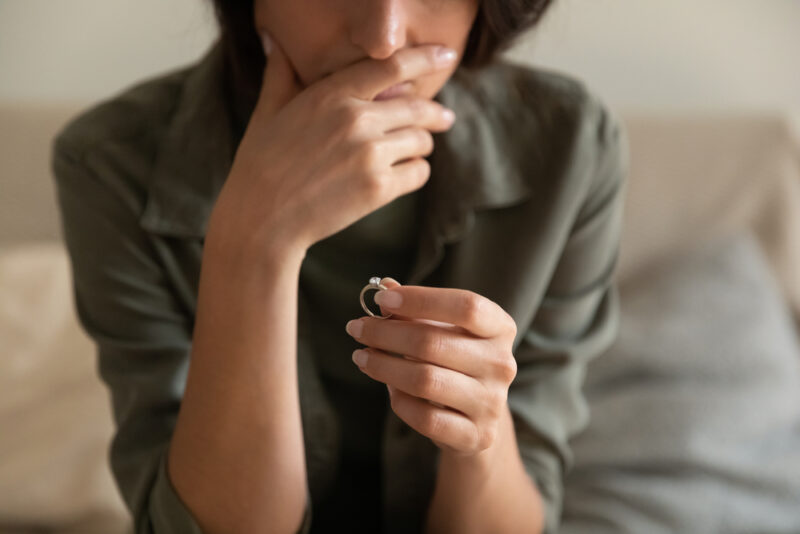
There isn’t a person on earth who thinks going through a divorce is easy. Your world is turned upside down – even if you’re the person asking for the divorce. The divorce process digs up a lot of emotions like sadness, anger, fear and embarrassment to name a few. So whether you’re separated and on your way to divorce or already through the process, finding ways to cope with all that has happened is important.
As a therapist, I can tell you that the ultimate goal here is to help you learn from what has happened and heal your heart. Those two are part of the big journey of coping with divorce and it’s how you get to the other side, ready to get on with your life.
In my practice, we work on the skills below to help your grieving and recovery process to go as smoothly as possible. That said, nothing about this time in your life is linear, so read through the tips and see which ones can help you the most. If you’re in Texas and looking for a therapist, either in person or virtually to help, please don’t hesitate to reach out.
Tips for Coping with Divorce
Going through a divorce most closely mirrors the grieving process that we all undergo when someone we love dies. Why? Because something in your life is ending. The loss is profound and the life transition taking place causes an emotional roller-coaster. Divorce can be messy, overwhelming, and exhausting. It’s also scary which is why finding ways to cope can help you heal from your divorce faster because it prompts you to take care of and protect yourself throughout the process.
There isn’t one special thing you can do to take the sting out of getting divorced but having a few tricks up your sleeve coupled with a plan of action can make the grieving process easier.
Here are 5 tips you can implement today that can make it easier to deal with a divorce.
Practice self-compassion
When was the last time you cut yourself a little slack? When you aren’t giving yourself a “pass” on taking accountability for your actions. Instead, you’re giving yourself permission to not be so hard on yourself while going through this process.
Perspective is hard when you’re going through the stages of divorce but it’s important to remember that there were two of you in the relationship. When guilt and shame start to pop up in the process, remember that it took two of you to begin and end your relationship. Acknowledge the role you played and forgive yourself.
Discover new hobbies or interests
Sometimes divorce can cause more downtime in your life which can lead to feelings of depression but when you have more downtime, that means you can also find new hobbies to fill your time.
Activities that get the endorphins pumping (like sports and exercise) can also keep depression at bay and they are healthy ways to relieve frustration and stress. This is also a good time to try something new like the cooking class you always wanted to take or the vegetable garden you mapped out a few years ago.
Distractions don’t have to be all-encompassing, they can be something new to add into your routine or schedule that help you keep your mind off of the divorce process. These new activities are also part of your self-care routine.
Invest in self care
When anyone writes about self care, they tend to give bland examples like getting your haircut or going for a massage. For many of us, those aren’t examples of self care – they fall into the “self maintenance” category. So, let’s first define what self care is.
According to the Self Care Federation, self care is the “practice of individuals looking after their own health using the knowledge and information available to them.”
The World Health Organization defines it as “the ability of individuals…to promote health, prevent disease, maintain health, and to cope with illness and disability with or without the support of a healthcare provider.”
Clear as mud, right?
Self care can be anything you do to take care of yourself physically, mentally, and emotionally. Research suggests that when you invest in self care, you have more positive health outcomes.
But, self care should also be something you enjoy doing. Think about those hobbies and interests mentioned earlier – they fall into the “self care” bucket. So does establishing a routine, eating healthy foods, enjoying nature, baking, spending time with friends and family, and being physically active.
Remember: self care looks different for everyone but should lean more towards the healthier-side of things you enjoy doing, not just the indulgent-side.
Tap into your support system
Anyone who has gone through a divorce will tell you that it’s emotionally taxing. They’d also tell you that you don’t have to suffer through your emotions alone. Lean on your closest friends and family members on your toughest days and when they ask how you’re doing, don’t answer “I’m fine” if you’re not.
Sharing your feelings with friends gives you a chance to get feedback on all that has happened and gives you a space to express your feelings without judgment. Fearing what others will say can keep people stuck and isolated. And while you may feel like solitude is the best course of action, it’s not. Neither is stuffing your feelings down. Start tapping into your support network by making plans with people for dinner, hiking, coffee, or a catch up date.
You could also use this opportunity to meet new people and create new connections with people who also partake in those new hobbies you’re going to embark on.
Bottom line: surround yourself with people who you enjoy being around because they’ll give you the space to vent and be vulnerable while also enjoying your company.
Try individual therapy or divorce counseling
Even when a divorce is amicable, there are a whole slew of complex emotions like sadness and anger that you’ll experience. Keeping those emotions to yourself rather than processing them isn’t great for your mental health.
Divorce counseling that is targeted at helping you deal with the strong emotions around your loss can be incredibly helpful. In individual therapy, you may find yourself paying more attention to mental health challenges like depression or anxiety that arise when your life is turned upside down and you’re on unsure footing. All of which are incredibly common after your heart is broken.
Reaching out to a professional can help you through the divorce process and set you up for life post divorce. It can also help you grow as a person, which can make your next relationship stronger.
Therapy is no longer just talking to someone about your feelings while they sit and listen. There is more to it. When you find a great therapist, they act as a thinking partner, supportive ear, and educator. Therapists can support you with coping skills and help with any gaps in your education around managing painful emotions and how to handle such a stressful time. This is how you move from coping with your divorce to investing in what’s coming in the future.
As a therapist, I want my clients to find a renewed sense of purpose whenever possible and to take charge of their emotional health. That’s how they see their divorce ultimately as something meaningful in their life.
How Long Will You Cope with Divorce?
Going through a divorce is one of the hardest experiences a person can go through. Unfortunately, the short answer is there isn’t a set amount of time for the grieving process. No one can really tell you that you’ll cope for so long and then move past it. Every situation is different. Plus, your feelings are involved which make it harder to predict when you’ll be ready to move on.
Since the length of time it takes to get divorced varies from situation to situation and the emotional baggage involved will be different for every couple, it’s impossible to pinpoint how long it’ll take for you to recover from your divorce. But, the tips above are what help you move through this chapter in your life and leave it in the past.
Even if you’re dealing with a complicated co-parenting situation, your emotional health is the foundation for less stress, pain and heartache in the future.
Moving Toward Healing After a Divorce
I also want you to remember that there is a difference between coping and healing.
Coping is what we do to get through events and periods of time in our lives.
Healing is what happens when we shift our thoughts, behaviors, and feelings about what happened so we’re no longer triggered when new (and similar) events occur.
Coping skills are important because they move you toward healing, but they can only take you so far. It’s in the healing that you recover from what happened.
Healing happens while you’re coping. And, of course, all of it takes time.
The only thing that I have seen that speed things along is therapy. And my feeling about that is because it normalizes time in your life, a part of your regular routine, where you honor what happened and where you are in your grief and healing process.
Therapy is the place where you bring your pain so you can explore its meaning and impact on your self-worth and self image. Sometimes, there are complicated details to sort through. Other times, coping with your divorce is really about making some sense out of what happened.
Divorce Counseling in Texas
So whether you’re reeling from sadness and anger and your daily life is upside down, you’re stuck in the past and need to let some of it go, or you need someone to witness your pain and help you sort through the aftermath of your divorce, I can help.
Please reach out for a complimentary consultation today.
Updated 11/21/24
Heal from Your Divorce
Working through a divorce on your own can be hard. Make it less stressful by talking to a therapist. In Texas? Reach out today.




